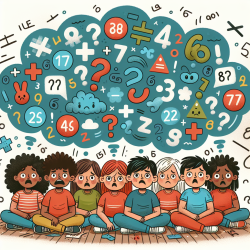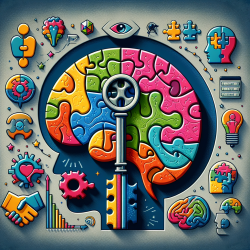Introduction
Mathematics anxiety is a common phenomenon affecting many children, particularly those with developmental dyscalculia (DD). This blog explores the findings from a study titled "Mathematics anxiety in children with developmental dyscalculia" by Rubinsten and Tannock (2010), which examines the intricate relationship between emotions and arithmetic performance in children with DD. The study highlights the potential of using affective priming as an indirect measure of math anxiety, offering valuable insights for practitioners working with children who struggle with math.
Understanding Developmental Dyscalculia
Developmental dyscalculia is a specific learning disability characterized by difficulties in processing numerical information, which cannot be attributed to sensory issues, low IQ, or inadequate education. It affects approximately 3.5% to 6.5% of the school-age population and often persists into adulthood if untreated. The condition is believed to have a genetic basis, with deficiencies primarily in the brain's parietal cortex regions.
The Study's Methodology
The study involved 23 children, 12 with DD and 11 typically developing peers, who participated in an arithmetic-affective priming task. This task used primes (positive, neutral, negative, or math-related words) followed by simple arithmetic equations to assess the influence of emotional primes on arithmetic performance.
Key Findings
- Children with DD responded faster to arithmetic problems preceded by negative and math-related primes, indicating a strong association between negative emotions and math performance.
- Typically developing children showed the opposite pattern, responding faster to problems preceded by positive primes.
- Math-related words had a similar effect as negative primes in children with DD, suggesting that these words are affectively related to math anxiety.
Implications for Practitioners
These findings suggest that math anxiety in children with DD is intricately linked to their emotional responses to math-related stimuli. Practitioners can use this knowledge to develop targeted interventions aimed at reducing math anxiety and improving math performance. Strategies may include:
- Creating a positive and supportive learning environment that reduces negative emotional responses to math tasks.
- Incorporating affective priming techniques to help children associate math with positive emotions.
- Providing individualized support and resources to help children with DD develop confidence in their math abilities.
Encouraging Further Research
The study highlights the need for further research into the relationship between math anxiety and developmental dyscalculia. Understanding the underlying cognitive and emotional processes can lead to more effective interventions and support for children with math-related learning difficulties.
To read the original research paper, please follow this link: Mathematics anxiety in children with developmental dyscalculia.










